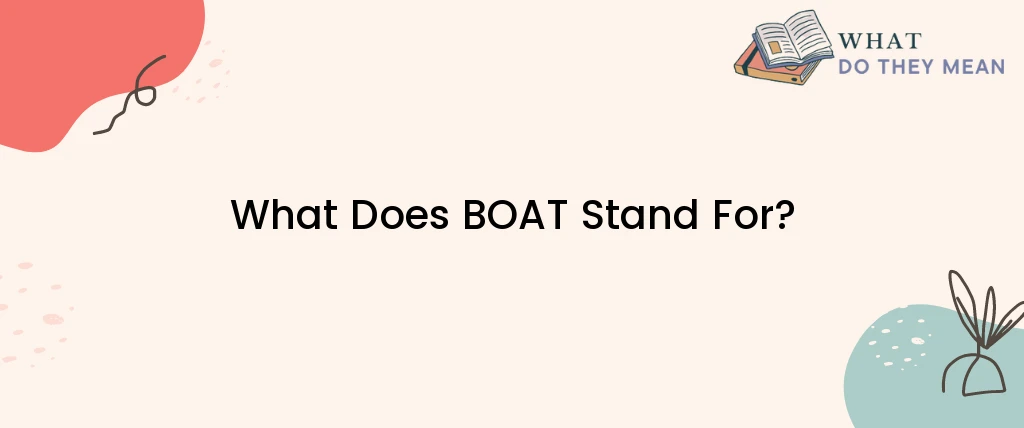The word “boat” is a common noun used to describe a variety of vessels used on water. Whether you’re a seasoned sailor or a casual observer, you’ve likely encountered the term “boat” in some form. Let’s explore the various meanings of “boat” and delve into its origin and usage in popular culture.
The Origin of the Term “Boat”:
The origin of the word “boat” can be traced back to the Old English word “bat,” which was used to describe a small vessel used for transportation on water. Over time, the meaning of “boat” evolved to encompass a wider range of vessels, from small rowboats to large cargo ships.
In terms of etymology, the word “boat” is believed to have roots in the Proto-Germanic language, from which many modern European languages, including English, have derived. The term has also been influenced by other languages, such as Old Norse and Dutch, which have similar words for “boat.”
Throughout history, boats have played a crucial role in transportation, commerce, and exploration. From the earliest rafts and canoes used by indigenous peoples to the massive cargo ships that traverse the world’s oceans today, boats have been an integral part of human civilization.
Common Meanings of “Boat”:
“Boat” is a versatile term that can refer to several different types of vessels, both for practical and recreational purposes. Some common meanings of “boat” include:
- Nautical vessels: “Boat” is often used to describe larger vessels used for commercial or military purposes, such as cargo ships, ferries, and submarines.
- Recreational watercraft: “Boat” can also refer to smaller vessels used for leisure activities, such as fishing boats, sailboats, and powerboats.
- Types of boats: Within the category of recreational boats, there are many different types, each with its own unique design and purpose. Some examples include kayaks, canoes, pontoon boats, and houseboats.
Regardless of the type of boat, the term “boat” generally refers to any vessel used for transportation or recreational purposes on water.
“Boat” as an Acronym:
In addition to its traditional meaning as a noun, “boat” can also be used as an acronym. An acronym is a word formed from the first letters of a multi-word name or phrase. In this case, “boat” can be used to represent various phrases, depending on the context. Some possible meanings of “Boat” as an acronym include:
- Break Out Another Thousand
- Bring Out Another Thousand
- Break Out Another Tool
- Body Of Watercraft Technology
It’s important to note that the use of “boat” as an acronym is less common than its use as a noun and may only be used in specific industries or communities. When encountering the term “boat” as an acronym, it’s important to consider the context in which it is used to determine its intended meaning.
“Boat” in Pop Culture:
The term “boat” has been referenced in various forms of popular culture, including movies, music, literature, and everyday expressions. Some examples of “boat” in popular culture include:
- Movies: Boats have been featured in many films, ranging from pirate adventures to romantic comedies. Some popular boat-themed movies include “Pirates of the Caribbean,” “Jaws,” and “Titanic.”
- Music: Boats have also been referenced in numerous songs, from sea shanties to contemporary pop hits. Some popular boat-themed songs include “Sloop John B” by The Beach Boys and “Life is a Highway” by Tom Cochrane.
- Literature: Boats have been a popular subject in literature for centuries, from ancient myths and legends to contemporary novels. Some well-known boat-themed books include “Moby-Dick” by Herman Melville and “The Old Man and the Sea” by Ernest Hemingway.
- Everyday expressions: Boats have also made their way into everyday expressions and idioms. Some popular expressions related to boats include “smooth sailing,” “rock the boat,” and “in the same boat.”
Overall, boats have been a recurring theme in popular culture, reflecting their significance in human history and their enduring appeal as a symbol of adventure and freedom.
Conclusion:
To sum up, the word “boat” is a versatile term with a rich history and cultural significance. From its origins as a simple means of transportation on water, to its use in popular culture, “boat” has come to represent a wide range of vessels and ideas. Whether you’re a seasoned sailor or just someone who appreciates the beauty of a sunset on the water, the term “boat” holds a special place in our collective imagination. Whether we’re exploring the open seas, enjoying a relaxing day on the lake, or simply using the term in everyday expressions, “boat” remains an integral part of our lives and our language.

As a researcher, I am curious and driven by the pursuit of knowledge. I approach my work with a critical eye, carefully evaluating sources and methods to ensure that my findings are accurate and reliable. Whether delving into scientific studies, historical records, or cutting-edge technologies, I am always seeking to expand my understanding and make new discoveries. I am dedicated to uncovering new insights and finding solutions to complex problems, and am driven by a passion for uncovering the truth.

